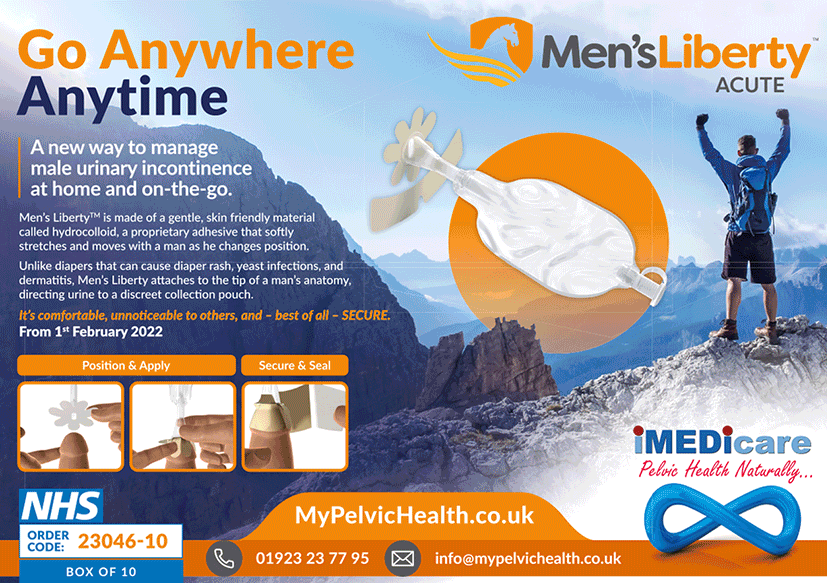There is a common misconception that urinary incontinence (the unintentional passing of urine) is untreatable and inevitable; that it is something people just have to put up with, especially with advancing age. While it is quite common, thought to affect up to 1 in 10 people in the UK, it can also be eliminated or improved in around two thirds of patients. However, this isn’t the case for everybody.
Because urinary incontinence (UI) is rarely talked about openly, there is a lot of misunderstanding around the issue. Therefore, whether someone is dealing with short term, long term or permanent incontinence, they might experience difficulties socially and psychologically. This article discusses the experience of stigma amongst people suffering from urinary incontinence, to create greater understanding and empathy around this common medical condition.
Stigma and UI: the basics
Definition of stigma: feelings of disapproval that people have about particular illnesses or ways of behaving.
Men, women and children can experience urinary incontinence and associated stigmas. Causes in adults can include stroke, some cancers, neurological conditions, dementia, obesity, presence of lower urinary tract symptoms and decreased mobility. Women are generally reported as having a higher prevalence of urinary incontinence, due to different anatomies and causes of urinary incontinence, and additional causes can include childbirth and menopause. It is also common for men to experience urinary incontinence following a prostatectomy, with rates increasing from 5% to 60% prevalence among this group.
Stigmatisation is a process of exclusion. When an issue, such as incontinence, is stigmatised, this leads to two groups existing: those who do have the trait, and those who don’t. Stigma can have a big impact on a person’s self-identity, and it is now well understood to have a serious negative effect on physical and mental health.
Why might UI be stigmatised more than other conditions?
We are brought up to understand from an early age that passing urine and faeces (wee and poo) should be done in private, and in a tidy way. Incontinence can rupture this social norm. Many people affected by urinary incontinence fear associations of uncleanliness, sexual impotence, or being ‘an outsider’ socially. They may fear being perceived – or may perceive themselves – as weak, dependent, or doddery. They may be embarrassed or ashamed.
Research has shown that the stigma of urinary symptoms is tied to how far the problem is perceptible – whether visually (such as marks on clothing or visible products), due to odour (such as the smell of urine in the home or on somebody themselves), or behaviourally (such as avoiding activities, or needing to make frequent trips to the bathroom). If someone has an ‘accident’ or is not able to contain their incontinence, they may be distraught and worried about what others might be thinking. This is an understandable response, but it’s important to bear in mind that urinary incontinence is a medial condition that should be treated with empathy.
The stigma of incontinence is a serious issue. Stigma creates stress, and then worsens people’s ability to deal with the stressful situation. It can lead people to stop living their normal lives, leaving the house, and going about their day-to-day activities, causing them to become isolated and withdrawn. This might mean they are less active, in turn causing greater physical and mental health issues. It can also remove people from their social support networks, cutting them off from people who can help.
Crucially, the shame felt as a result of bladder and bowel health problems, including urinary incontinence, can be a barrier to treatment. People might deny or conceal their condition, and put off seeing a doctor, especially if the matter is concealed from even close family and friends. This delays timely treatment which might lead to a cure. Remember, there are lots of management and treatment options out there. Without medical advice and help, a potentially resolvable problem can stay untreated.
Stigma has a strong link to mental health concerns, such as reduced self-esteem, increased anxiety and depression, and can affect relationships, employment and overall life stability. Many people with incontinence symptoms report feelings of powerlessness, and feel a lack of agency over their own body. If you are struggling with your mental health as a result of urinary incontinence, it is important to speak to your doctor, or reach out to a mental health organisation, such as a local NHS service, or Mind.
“Crucially, the shame felt as a result of bladder and bowel health problems, including urinary incontinence, can be a barrier to treatment.”
What can be done to reduce people’s exposure to stigma?
New treatment and management options have been developed to provide a broader range of choices to people. These can lead to rehabilitation or better management of incontinence, meaning reduced exposure to stigma, and improved quality of life. Urinary incontinence is common but every patient’s position is unique. The good news is that product innovation continues, leading to a wider range of available products to help people best manage their particular condition.
Just as stigma can cause an obstacle to treatment and management, effective treatment and management can help people regain feelings of agency, and get their self-identity back. This is why seeking help from medical professionals and experts in incontinence products is important.
Ultimately, people dealing with continence issues do not need to suffer in silence. All health concerns deserve to be treated with respect, and the right to comfort and dignity are human rights. There are a greater number people who are affected by incontinence than you would think, and there are organisations and professionals who can provide support and guidance for improved quality of life.
This article is part of the Education Spotlight on Urinary Incontinence, supported by iMedicare. You can also read more about constipation in our information library here.



Comments are closed